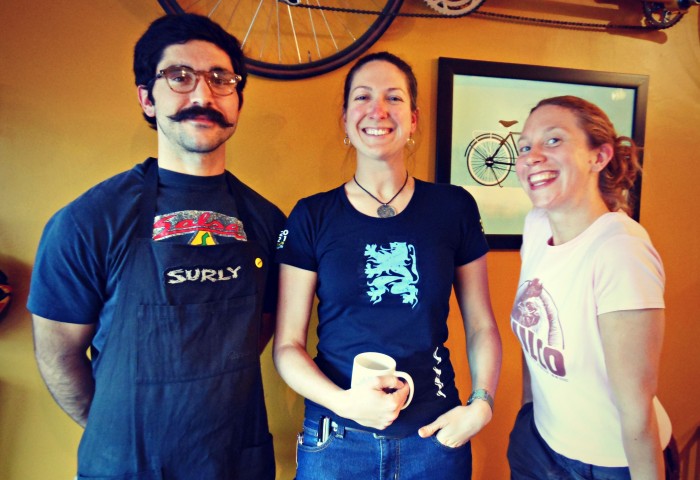The days of closing a business deal over a power lunch at the Four Seasons may be over, but work and the midday meal remain intrinsically linked. WorkEatPlay, a New York City-based startup, is redefining this relationship. The company’s remote team takes unused space in restaurants that are open for lunch and retrofits them for coworking.
Peter Litvinenko spoke with us about how his company makes it happen—all while enjoying good food along the way.
Tell us about yourself. How did you get involved with WorkEatPlay?
I started my career out managing hotels and restaurants and then went into investment banking. One day, A former hotel owner I worked for reached out to see if I would join his team to launch a new hotel concept with coworking in the lobby. That became the day I became captivated with how perfectly the hospitality and coworking industries could work together. My specialty quickly became understanding the dynamics in integrating coworking within restaurants and hotels. I went on to help launch a series of hostels with coworking spaces in South America and consulting for a handful of coworking companies in New York City.
I began to realize that the common denominator behind the success or failure of the projects I worked on was always real estate cost. You can have the best coworking concept around, but if you have an expensive lease, you probably won’t be around for very long. At the same time, the hardest thing for an early-stage startup is finding an affordable place to work from. One day, we were sitting at a restaurant, and I said to my friend, “you know, I never really know the difference between when I’m working, eating, or playing.” That restaurant became the “office” that I would write my business plan from.
How many employees and contractors do you have?
5-8
Please tell us about the importance of location independence at your company.
I don’t think you can build a company for the remote workforce from a cubicle. You have to get out and understand your customers and what’s important to them. We find that location independence helps us produce our best work.
Did you start with the intention of having a distributed or nomadic team? If not, when did you decide to support people working remotely?
Our mission was always to provide for a person on the go. Not just space, but a community, and a lifestyle that supports the blend of traveling for both business and pleasure.
What are some of the challenges you face as a team without a central location or office?
Each employee realizes that he or she has to be extremely organized, communicative, and disciplined for the rest of the team to be successful. That said, we each joined this company not just for the product but for the people that we get to work with—and you can always find us working together from one of our spaces.
What’s the upside that comes with not having a central location or office?
Flexibility. As an early stage startup, there are no real office hours. Our devices make it a blessing (and sometimes a curse) to always be in touch and working 24/7.
Are there significant non-office workspaces in the history of building your company—a favorite coffee shop, bar or similar space?
Our biggest inspirations have come from today’s best lifestyle hotel brands. Sean McPherson (Bowery Hotel), Andre Balaz (Standard Spa, Chateau Marmont, Standard Hotels), Alan Faena (Faena Hotels) and Jayma Cardosa (The Surf Lodge) have all built spaces that go way beyond rooms or food. They’ve created communities full of art, music, and constant inspiration.
What percentage of your company regularly works remotely?
100%
Any advice or best practices for supporting the work styles of your teammates from a distance?
Have patience, and don’t read too far into text/emails. Distinguishing emotion through digital correspondence is hard. Some things can come off badly when misread. Also, be overly detailed, transparent, and over communicate!
What types of places do your teammates choose to work from when remote?
We love restaurants. We’re a team of foodies so enjoying good food is a plus to finding new partners!
What qualities do you look for when hiring for a distributed team?
Responsiveness, responsibility, and strong communication skills.
Communication can be a challenge for remote teams. How do you keep your teammates connected and on the same page?
We would be lost without software such as Slack, Asana, Salesforceiq, and Google Drive. We also call each other at least once a day—even if it’s just to catch up.
What are the keys to good remote team management?
Trust is essential. Everyone works at different times and a different pace, and you have to make sure that you respect that.
You’ve developed an excellent service that helps the distributed workforce at large. Why did you choose to do that?
Because it helps people live happier, more balanced lives.
What are your thoughts on Workfrom’s role in the way work is getting done—now and in the future?
We love it! Workfrom has built a truly global community that allows individuals from all over to share best practices, secrets, and the wonders of the remote lifestyle!
Is there anything else you’d like to share?
Anywhere can be your office, and we want to support that it’s not just a workspace—it’s a lifestyle.
. . .
Please share your thoughts in the comments below, or tweet @Workfrom using #untethered.



Responses